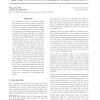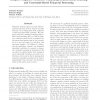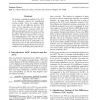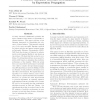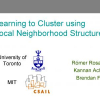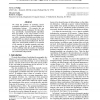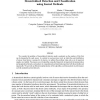94
Voted
ICML
2004
IEEE
16 years 1 months ago
2004
IEEE
The standard model of supervised learning assumes that training and test data are drawn from the same underlying distribution. This paper explores an application in which a second...
101
click to vote
ICML
2004
IEEE
16 years 1 months ago
2004
IEEE
This paper extends previous work on the Skewing algorithm, a promising approach that allows greedy decision tree induction algorithms to handle problematic functions such as parit...
ICML
2004
IEEE
16 years 1 months ago
2004
IEEE
Reminder systems support people with impaired prospective memory and/or executive function, by providing them with reminders of their functional daily activities. We integrate tem...
ICML
2004
IEEE
16 years 1 months ago
2004
IEEE
106
click to vote
ICML
2004
IEEE
16 years 1 months ago
2004
IEEE
In many real-world classification problems the input contains a large number of potentially irrelevant features. This paper proposes a new Bayesian framework for determining the r...
101
Voted
ICML
2004
IEEE
16 years 1 months ago
2004
IEEE
Predictive state representations (PSRs) have recently been proposed as an alternative to partially observable Markov decision processes (POMDPs) for representing the state of a dy...
ICML
2004
IEEE
16 years 1 months ago
2004
IEEE
111
click to vote
ICML
2004
IEEE
16 years 1 months ago
2004
IEEE
We consider learning in a Markov decision process where we are not explicitly given a reward function, but where instead we can observe an expert demonstrating the task that we wa...
ICML
2004
IEEE
16 years 1 months ago
2004
IEEE
We study the problem of modeling species geographic distributions, a critical problem in conservation biology. We propose the use of maximum-entropy techniques for this problem, s...
85
Voted
ICML
2004
IEEE
16 years 1 months ago
2004
IEEE
We consider the problem of decentralized detection under constraints on the number of bits that can be transmitted by each sensor. In contrast to most previous work, in which the ...
